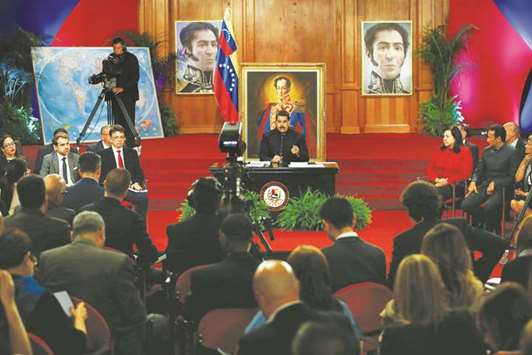Venezuela’s President Nicolas Maduro yesterday said his socialist party’s landslide victory in disputed regional elections had delivered a “strong message” to the US and its allies.
“Our people have given a strong message to imperialism, to (US President Donald) Trump, to its regional allies and to the local right-wing,” Maduro told a news conference after the opposition rejected the results and the US and EU said they were deeply flawed.
He accused the “imperial forces of the north” of launching “a psychological, political and economic war” against his government.
“It is not going to be an economic war or an induced inflation that makes this people give up,” said Maduro, who according to opinion polls has an 80% dissatisfaction rating among Venezuelans who are struggling with serious food and medicine shortages and record inflation.
Washington condemned “the lack of free and fair elections” while the European Union called the results of Sunday’s vote “surprising” and said it was necessary “to find out what really happened.”
The president of neighbouring Colombia, Juan Manuel Santos, said yesterday that Venezuela needed to hold general elections under an “independent” electoral authority.
The opposition Democratic Union Roundtable (MUD), which accuses the National Electoral Council of being a vehicle of the government, rejected the result and called for a full audit of the electoral process saying it was riddled with “irregularities.”
The government claimed victory in 17 of the 23 regional governorships in Sunday’s poll.
Several opinion polls had indicated the MUD would win the vast majority of the governorships.
Stunned by the crushing defeat that undermines their aim to win the presidency in 2018, the opposition Democratic Unity coalition refused to acknowledge the results.
Though the coalition has complained of an unfair playing field — from abuse of state resources to last-minute moving of vote centres away from opposition strongholds — it has not given detailed evidence of ballot-tampering.
Some opposition figures have acknowledged that abstention by their supporters, disillusioned by the failure of street protests to dislodge Maduro earlier this year, was a big factor.
One losing opposition candidate even conceded defeat, breaking with the official coalition position as he acknowledged a flawed re-election campaign.
“We lost, I say it responsibly,” said Henri Falcon, outgoing governor of Lara. “We need courage to recognise truth in adversity.”
Government leaders have smarted at fraud accusations. “Our electoral process is recognised globally as one of the most secure,” Foreign Minister Jorge Arreaza told foreign diplomats in a meeting yesterday.
Despite widespread food shortages, runaway inflation and a tanking currency, Venezuela’s government retains significant bastions of support, especially in poorer, rural parts of the country.
With the opposition coalition’s dozens of parties arguing over whether there was fraud, what went wrong, and where to go next, it will need to regroup and map strategy quickly heading into the 2018 presidential campaign.
Its very future may even be in doubt, since many young activists who took to the streets for four straight months of protests and pitched battles with security forces earlier this year feel disillusioned and betrayed by their leaders.
The unrest killed at least 125 people, left thousands injured and arrested and prompted a growing number of Venezuelans to seek refuge abroad.

Venezuela’s President Nicolas Maduro talks to the media during a news conference at Miraflores Palace in Caracas, Venezuela, yesterday.
